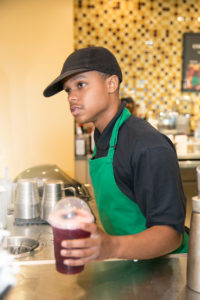Recognizing the Gifts and Talents of All
 People with disabilities of all genders, races, socioeconomic statuses, and ethnicities have a history of making the world and our communities richer, better places. What potential do we then lose when we allow barriers to prevent our fellow humans from participating?
People with disabilities of all genders, races, socioeconomic statuses, and ethnicities have a history of making the world and our communities richer, better places. What potential do we then lose when we allow barriers to prevent our fellow humans from participating?
Some of the most groundbreaking inventions and innovations throughout human history have been inspired and conceived by people with disabilities. Some of these figures are household names: Thomas Edison, Temple Grandin, Albert Einstein, Leonardo Da Vinci and Stephen Hawking. But while many of the contributions of people with disabilities are in the mainstream, their names are often left out of the history textbooks and out of the conversation.
I recently came across a New York Times article that told the story of the OXO brand; A husband and wife teamed up to create a product that would be comfortable for Betsy, the wife, to hold (she had arthritis). As a result, they came up with a line of kitchen products based on the philosophy of universal design. While I had seen the company’s products lining the shelves of many major department stores, the story behind it, and the fact that it was created for all hands, escaped me. According to the article, it has somehow escaped many people, too. This is just one of the many stories of inventions born of necessity for people with disabilities but ultimately adopted by people of all abilities. See also: The typewriter, text messaging, and the talking remote.
Even with all these accomplishments, the movement towards an accessible and inclusive society continues. Is our notion of what it means to contribute to society even inclusive of people with disabilities?
Right now, society is at a crossroads. People are paying closer attention to social issues that are important to them, looking for ways to be more involved. However, for society to continue to improve for all people living in it, we must face tough decisions about our institutions. Finding and removing the barriers within those institutions will be a challenging process.
At Easterseals, one barrier that is in the forefront of our minds is health care. Threats to Medicaid are looming, and additional cuts or caps to Medicaid will severely impact the services we provide. In fact after past cuts to Medicaid, 62% of our clients surveyed (including individuals with disabilities and seniors) were unable to access services like employment and training programs due to a lack of community provider options. We grapple with this reality while still working with people with disabilities to overcome barriers, some of which are societal in nature. As a result, we support some of society’s most powerful change agents. What kind of society will they want to create?
Michael, 34, an Easterseals Thrive supporter and freelance writer, said, “Traditionally, if you ask someone what they do, they’ll talk about their job. A lot of avenues are closed to me due to my mental health and to a lesser extent my physical health. My depression has significantly hindered my ability to succeed in academics which has, in turn, closed a lot of doors for me to achieve gainful employment. This further exacerbates my depression.
“Individuals are capable of contributing in more ways than economically. Simply being a good friend or an emotional support for other people can be a means of adding to society. Being someone who other people can rely on when they’re having a rough time is a remarkably useful ability. I think that this form of emotional labor has been undervalued traditionally, but that it is finally starting to come around as a viable source of worth for one’s self and within a community.”






